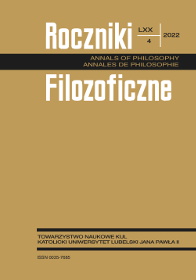PLURALISM IS NOT ENOUGH FOR TOLERANCE. PHILOSOPHICAL AND PSYCHOLOGICAL REFLECTIONS ON PLURALISM AND TOLERANCE
PLURALISM IS NOT ENOUGH FOR TOLERANCE. PHILOSOPHICAL AND PSYCHOLOGICAL REFLECTIONS ON PLURALISM AND TOLERANCE
Author(s): GEORG GASSERSubject(s): Social Philosophy, Philosophy of Religion, Social psychology and group interaction, Personality Psychology, Sociology of Culture, Globalization, Sociology of Religion
Published by: Towarzystwo Naukowe KUL & Katolicki Uniwersytet Lubelski Jana Pawła II
Keywords: religious pluralism; rationality of worldview beliefs; psychology of tolerance; personality traits and tolerance;
Summary/Abstract: The issue of religious tolerance is increasingly raised in a globalized world with societies becoming more and more religiously diverse and inhomogeneous. Religious tolerance can be defined as the practice of accepting others as acting in accordance with their religious belief system. Philosophers have recently begun to study more thoroughly the relationship between religious pluralism and religious (in)tolerance with a main focus on the epistemic question of whether the recognition of and reflection on religious pluralism might lead to greater religious tolerance. The major thrust of this idea is that any genuine reflection of a person about her epistemic peers adhering to other religions will weaken the person’s epistemic justificatory basis for believing that her own religious beliefs are better warranted than the religious beliefs of her peers. The rational consequence of the recognition of this justificatory fact, in turn, should lead to more religious tolerance and to a weakened dismissive attitude towards adherents of other religions. The main aim of this paper is to investigate the plausibility of this account against the background of existing empirical, in particular psychological literature: Does increased contact with adherents of other religious traditions indeed lead to more tolerance? How are we able to show a deeper understanding for people with different religious beliefs and to take on—at least partially—their perspective? What are potential psychological obstacles to these achievements? Resources from research on intergroup toleration, social identity-theories, developmental psychology and personality traits will be used for tackling these questions. This shall help to broaden the so far rather narrow epistemic philosophical perspective on religious pluralism and (in)tolerance by embedding it into the larger context of constitutive traits of the human psyche.
Journal: Roczniki Filozoficzne
- Issue Year: 70/2022
- Issue No: 4
- Page Range: 395-414
- Page Count: 20
- Language: English

